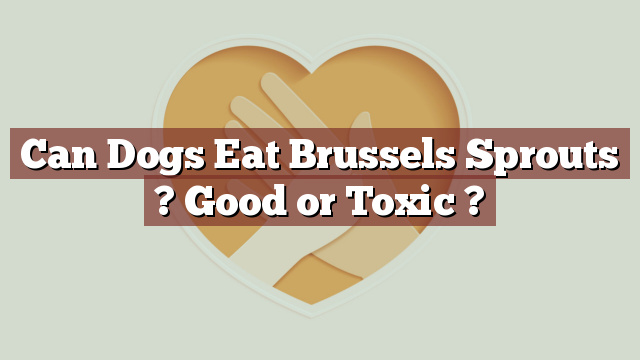Can Dogs Eat Brussels Sprouts? Good or Toxic?
Knowing what foods are safe for our furry friends is essential for their overall health and well-being. One food that often comes into question is Brussels sprouts. These mini cabbages have gained popularity among humans due to their numerous health benefits. But can dogs enjoy this nutritious vegetable as well? Let’s explore the nutritional value of Brussels sprouts and whether they are safe or toxic for dogs.
Nutritional Value of Brussels Sprouts
Brussels sprouts are packed with essential nutrients that can benefit both humans and dogs. They are an excellent source of vitamins C and K, which contribute to a strong immune system and healthy blood clotting. Additionally, Brussels sprouts contain fiber, folate, manganese, and antioxidants that support overall health and digestion. These nutritional components make Brussels sprouts an appealing option for those looking to incorporate more vegetables into their dog’s diet.
Are Brussels Sprouts Safe or Toxic for Dogs?
Yes, dogs can eat Brussels sprouts. In fact, they are generally safe for our canine companions to consume. However, it is important to remember that each dog is unique, and some may experience digestive sensitivity or allergies to certain foods, including Brussels sprouts. Therefore, it is crucial to introduce any new food gradually and in moderation to assess your dog’s individual response.
Potential Risks or Benefits of Dogs Eating Brussels Sprouts
While Brussels sprouts offer several health benefits, they may also pose some risks if not prepared or served properly. One potential concern is the high fiber content of Brussels sprouts, which can lead to gastrointestinal issues such as gas or bloating in dogs. It is crucial to cook Brussels sprouts thoroughly to make them easier to digest and reduce the risk of digestive discomfort. Additionally, avoid seasoning the sprouts with any harmful ingredients like garlic or onion, as these can be toxic to dogs.
On the flip side, the vitamins and antioxidants present in Brussels sprouts can contribute to your dog’s overall health. The fiber content can aid in regular bowel movements and promote a healthy digestive system. However, it is essential to remember that Brussels sprouts should not serve as a substitute for a balanced and complete diet specifically formulated for dogs. They should be offered as an occasional treat or added to their regular meals in small portions.
What to Do if Your Dog Eats Brussels Sprouts
If your dog accidentally consumes Brussels sprouts or if you observe any adverse reactions after feeding them this vegetable, it is advisable to monitor their behavior and consult a veterinarian if necessary. While Brussels sprouts are generally safe for dogs, individual sensitivities can occur. Signs of digestive distress, such as vomiting or diarrhea, should never be ignored and warrant immediate veterinary attention.
Conclusion: Can Dogs Eat Brussels Sprouts Safely?
In conclusion, dogs can eat Brussels sprouts safely, provided they are cooked thoroughly and served in moderation. These mini cabbages offer a range of essential nutrients that can contribute to your dog’s overall well-being. However, it is crucial to be mindful of potential digestive sensitivities and allergies that some dogs may have. Always introduce new foods gradually and monitor your dog’s response. As with any dietary changes or concerns, consulting a veterinarian is recommended to ensure the best care for your beloved pet.
Thank you for investing your time in exploring [page_title] on Can-Eat.org. Our goal is to provide readers like you with thorough and reliable information about various dietary topics. Each article, including [page_title], stems from diligent research and a passion for understanding the nuances of our food choices. We believe that knowledge is a vital step towards making informed and healthy decisions. However, while "[page_title]" sheds light on its specific topic, it's crucial to remember that everyone's body reacts differently to foods and dietary changes. What might be beneficial for one person could have different effects on another. Before you consider integrating suggestions or insights from "[page_title]" into your diet, it's always wise to consult with a nutritionist or healthcare professional. Their specialized knowledge ensures that you're making choices best suited to your individual health needs. As you navigate [page_title], be mindful of potential allergies, intolerances, or unique dietary requirements you may have. No singular article can capture the vast diversity of human health, and individualized guidance is invaluable. The content provided in [page_title] serves as a general guide. It is not, by any means, a substitute for personalized medical or nutritional advice. Your health should always be the top priority, and professional guidance is the best path forward. In your journey towards a balanced and nutritious lifestyle, we hope that [page_title] serves as a helpful stepping stone. Remember, informed decisions lead to healthier outcomes. Thank you for trusting Can-Eat.org. Continue exploring, learning, and prioritizing your health. Cheers to a well-informed and healthier future!

